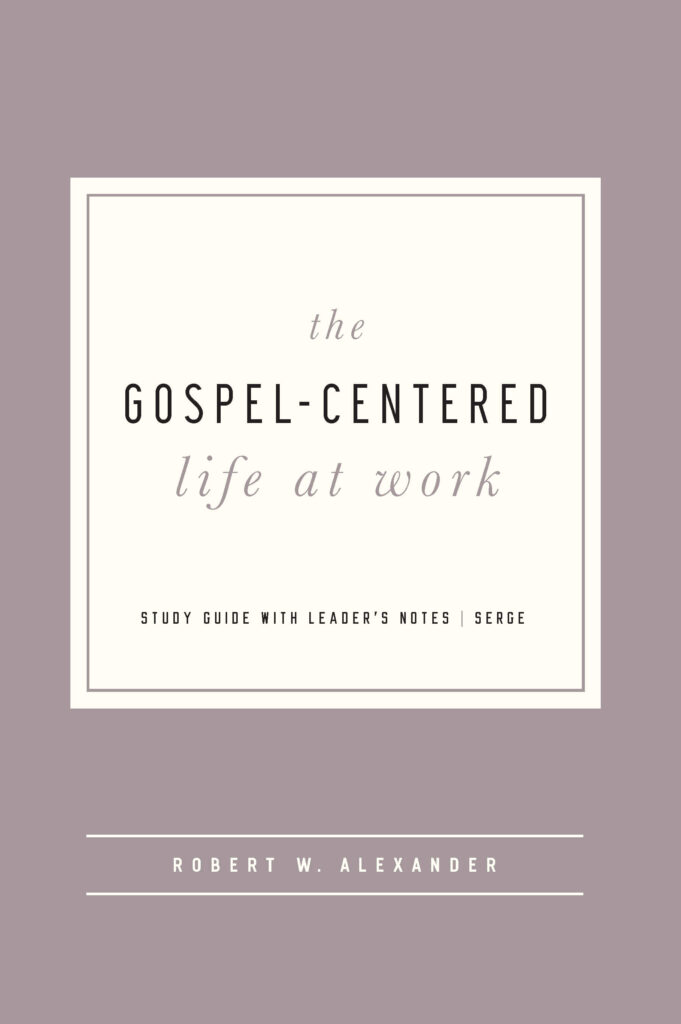A friend who just lost his job sits across from you with tears in his eyes. “I know I have a purpose,” he says. “I need to know that what I do matters, that I’m doing what God wants me to do.”
A young mom shares with her friends at playgroup, “I just wasn’t prepared for the drudgery of caring for a baby. I love her so much, but how do you cope with doing the same thing day after day on little or no sleep?”
“My work is so stressful,” a hardworking executive confesses. “Even when I’m home I’m connected to work electronically. I know my family wishes I wasn’t always ‘checking in,’ but they don’t understand what’s expected of me. I don’t even have the time to think about God and what he wants. It seems like just one more thing to do.”
“I’m trying to get my schoolwork done, but everyone around me is partying,” a college student says. “I don’t know if I’ll get a job when I graduate anyway, so usually I go for the fun. I’m a Christian, but I don’t know how that connects to life right now. Maybe I’ll work on that later.”
“Homeschooling my children was so much work, but I loved it,” a mom said. “But now my oldest son doesn’t want to go to church or do anything. What was it all for?”
How about you? Most likely you also have questions about the meaning, significance, and motivation for what you do. We all want the work we do to make a difference, yet we feel the gap between the realities of daily work and our lives as Christians.
We wonder:
- Am I doing the right thing?
- Why do I get so afraid when I make a mistake at work?
- What should I do with the rest of my life?
- Is it possible to go to work and not get involved in gossip and politics?
- My work is unpaid; does that mean it’s not important?
- Am I a good parent?
- Why is work so stressful?
- Is what I’m doing making a difference?
- What if I lose my job? Who will provide for my family?
These questions are not just about work. They are spiritual questions about faith, meaning, significance, identity, and the struggle with sin. The struggle to bring work and faith together is as old as the fall of humanity. Ever since Adam and Eve sinned, they experienced God’s good gifts of work, childbirth, and relationships as broken and hard. We know this isn’t the way it’s meant to be, but we wonder how (and if) our lives can be made whole again.
A Deeper Understanding of Vocation
In Genesis 1 and 2, we see God at work, creating, separating, filling, examining, and declaring all things good. God’s intent was for human life to bind together work, family, personal spirituality, and worship into a seamless tapestry. The need to apply faith to work wasn’t necessary before the fall since Adam and Eve enjoyed a perfect relationship with God, each other, and creation. One day in the future, the effects of the fall will come to an end. We will see the end result of Christ’s first and second comings. All of life will be made new. Heaven will come to earth and sin, sorrow, suffering, and brokenness will be banished. Life in its fullest sense will be restored through Christ’s completed work.
Right now we live “in between.” Life is still broken, but something new has happened. God has come to earth to be with his people. Jesus, God-with-us, purchased healing and wholeness for us by his death on the cross. When we come to him in faith and repentance, our sins are forgiven. We are given the gift of eternal life and a whole new life right now.
The power that raised Christ from the dead is now working to remake us and everything we do (Ephesians 1). This is the essence of the gospel message.
Because of these realities, even the simplest tasks we perform by faith become acts of worship reflecting God’s character and ways. This is the new vocation or calling of those who live by faith. Faith changes everything we do. The sixteenth-century Christian reformer Martin Luther put it this way:
When a father goes ahead and washes diapers or performs some other menial task for his child in Christian faith, God, with all his angels and creatures, is smiling, not because that father is washing diapers, but because he is doing so in Christian faith.
Martin Luther, adapted from “The Estate of Marriage,” (1522) in Luther’s Works Volume 45: Christian in Society II. Walther I Brandt, ed. (Minneapolis: Augsburg Fortress Press, 1962), p. 41. (Author Paraphrase)
Do you see how living by faith can transform our idea of vocation? By faith we depend on Jesus to walk with us. We rely on his Spirit to guide us so that our relationship with Christ brings life to the wearisome, broken aspects of life. We can participate in God’s work wherever he has called us. Whatever our role—student, dishwasher, waitress, stay-at-home mom, working mom, office staff, church staff, small business owner, doctor, plumber, artist, contractor—we do all things with Christ, because of him, and with the Spirit’s help (Philippians 4:13).
Christ transforms our work from something we do to fulfill our own goals into something much more significant. All our work becomes kingdom work, done in the service of the King for his good purposes. This gives meaning and significance to the simplest of tasks. Christ called us to live for him; he prepared good works for us to do, and as we respond in faith, we realize that all we do is in his hands (Ephesians 2:8–10). This is what vocation means for those who know Jesus. It’s not something relegated to a narrow sector of life. Everything is transformed.
The idea of partnering with God through your vocation may not be the way you naturally think about life. For some, life feels like a burden when we don’t see that God is sustaining the world and advancing his kingdom through us, his children. For others, work becomes something we hope will provide things we think God can’t or won’t give us—what the Bible calls our idols. Work then becomes a way to pursue those idols and ultimately pursue meaning and fulfillment apart from Christ. We don’t really believe that Christ alone can truly satisfy us. When that happens, work soon becomes a trap where we are either proud of what we have achieved or discouraged by our failures.
Our tendencies will always be to minimize God’s presence in our work, making everything a grind for survival, or to elevate our own efforts and accomplishments apart from God. In light of this we must see that the believer’s work is a partnership with Jesus, who already achieved success on our behalf and offers mercy and grace in every struggle (Hebrews 4:14–16). We need to hold onto gospel truths to live out our vocation in this broken world. These truths include:
- Daily forgiveness: We need the forgiveness Jesus purchased for us on the cross for the ways we live for our work instead of God’s purposes (1 John 1:9–10).
- Daily help from the Spirit: We need the Spirit to change us so that we live for God as partners in his kingdom (Luke 11:13).
- Daily faith perspective: We need God to help us see life from his perspective instead of our own (Ephesians 2:8).
- Resurrection power: We have to ask for the power that raised Christ from the dead to give us strength and help (Ephesians 1:15–23).
- God’s power and control: When work goes badly wrong, when we or others fail, we need to remember that God has the final word. All things work for the good of those who love him and are called according to his purposes (Romans 8:28).
Meaningful work is not all there is to life, but a meaningful life is not possible without the knowledge that God is at work, using our everyday efforts for his extraordinary purposes. As we make the gospel the true center of our work, God will use us in his kingdom and use our work struggles to make us more like him.
Excerpted from The Gospel-Centered Life at Work © 2014 by Robert W. Alexander. Used with permission of New Growth Press. May not be reproduced without prior written permission.
The Gospel-Centered Life at Work
The ten lessons in this small group study will help you see how Jesus’s work for you applies to and transforms the difficulties and drudgery of the daily grind. Each lesson is self-contained, featuring clear teaching from Scripture, and requires no extra work outside of the group setting.






